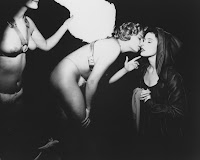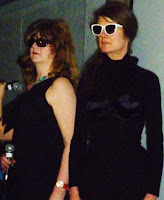
Ladies and Gentlemen, the Fabulous Stains (dir Lou Adler)
Christopher Strong (dir Dorothy Arzner)
I'm all for reclaiming lost films and assessing them in the light of modernity. Certainly, last night, having viewed these two, I am full of thoughts, some contradictory. It's also sobering to think how little has changed, in some ways, since these two films were shot and released.
Ladies and Gentlemen, the Fabulous Stains was presented under the auspices of
Unskinny Bop and is obviously one of their favourites and cited by many bloggers as proto-
Riot Grrrl, so I was looking forward to my first viewing of it. Odd I have never seen it, as though it had a small release in 1982, apparently it has gained most of its cult status from repeated cable viewings in the '80s. I did have access to cable TV in the '80s but never caught it. Too busy watching
Radio 1990, I guess.
Well, what to say? There is so much right about this film, from its portrayal of disaffected teenaged girls from small towns seeking escape, to its portrayal of a cynical and manipulative music industry, to its hilarious depiction of British bands taking to the road for their big breakthrough US tours becoming disillusioned. (How many times does Paul Simonon ask: "When do we get to California?")
But, feminist? Proto-Riot Grrrl? I don't think so.
Diane Lane's Corinne Burns sets off with her sister and cousin as The Stains to make it out of Charlestown, PA. Her only concern is getting out, not connecting with other girls or making a statement. At no point in the film does she really have any contact with her audience, other than insulting one woman in the front row of the band's first gig. While legions of girls follow The Stains and dress like them, taking up their mantra of "We Don't Put Out", this is portrayed as some kind of herd-like fashion statement, not any kind of empowerment.
Crucially, for me, there is no indication any of these Skunks forms her own band or moves from being a consumer of culture to a creator. This was the important message of both first-wave punk and Riot Grrrl: DIY. That doesn't happen in the film. And as for The Stains' supposed triumph, becoming a fluffy MTV band and losing all their rough edges and anger? How is that a triumph? I think the film works brilliantly as a satire of the power of media and is quite prescient of reality TV. (I also think Spinal Tap took some pointers from it.) But, I can't see much of a feminist message.
As for the subtextfest that is
Christopher Strong, crikey.
Dorothy Arzner and
Katharine Hepburn. Need I say more? Well, yes. Made in 1933, this period piece set in London features Hepburn in marvellous outfits (including a jaw-dropping shiny moth costume, complete with antennae) taking to the skies as a pioneering aviator locked in a quite ludicrous romance with dull aristo Colin Clive. Can't see it myself. But, Arzner and screenwriter Zoe Akins work in some marvellous mixed messages. To wit, saintly married lady and mother
Billie Burke utters the immortal line: "Marriage and children make almost any woman old-fashioned and intolerant." How the audience roared at that one. But, of course Hepburn's transgressive, trouser-wearing character cannot possibly get away with her behaviour and dies a fiery crash landing death. Arrgh.
 Out of the Blue (dir Alain Tasma)
Out of the Blue (dir Alain Tasma)
![Reblog this post [with Zemanta]](http://img.zemanta.com/reblog_e.png?x-id=5893c56d-3e00-4fc0-95b3-195442b37ad7)

![Reblog this post [with Zemanta]](http://img.zemanta.com/reblog_e.png?x-id=6e71f7df-af1b-4d1f-b294-54d6d606c775)

![Reblog this post [with Zemanta]](http://img.zemanta.com/reblog_e.png?x-id=30a94471-a6a2-4655-a2ae-5593a01d79fe)

![Reblog this post [with Zemanta]](http://img.zemanta.com/reblog_e.png?x-id=10c0536f-dc4b-4acc-af9d-7119649beb08)



![Reblog this post [with Zemanta]](http://img.zemanta.com/reblog_e.png?x-id=97518a12-d7b9-4a7e-9684-ad322f5cdee6)